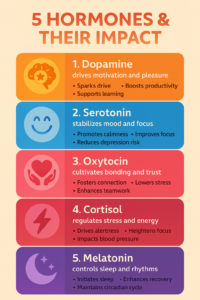Do your dreams often stall after a burst of motivation? The real driver of progress isn’t motivation—it’s discipline. By shaping your brain’s habits through neuroplasticity, you can create lasting change. This actionable protocol, inspired by structured systems like schools, will help you build a disciplined lifestyle that works even when motivation fades.
What Is Discipline?
Discipline means consistently taking action toward your goals, training your brain to focus on progress instead of excuses. While motivation comes and goes, discipline builds a steady routine—like how schools create success through daily habits. It supports your wellness by bringing balance and mental clarity, helping you grow and thrive.

Step-by-Step Protocol to Build Discipline
Step 1: Set One Micro-Goal
Small steps lead to big results. Starting with an easy, manageable goal makes it easier to stay consistent.
- How: Pick a quick 5-minute task, like a short workout or reading one page.
- Why: Small goals prevent overwhelm and help your brain connect effort with success.
Step 2: Create a Trigger-Routine System
Consistency, not willpower, builds discipline. Linking new habits to daily routines makes them automatic.
- How: Attach a new habit to something you already do (e.g., “After brushing my teeth, I’ll meditate for 1 minute”).
- Why: Turns new habits into routine, reducing the need for constant decision-making.
Step 3: Create a Daily Schedule
A daily plan keeps you focused on your priorities. Scheduling helps you follow through with disciplined actions.
- How: Spend 30 minutes planning your day and include time for your micro-goal.
- Why: A clear plan reduces mental fatigue and keeps you focused on what’s important.
Step 4: Track Habits with an App
Tracking keeps you accountable and helps you see your progress. Visual results keep you motivated.
- How: Use a simple habit-tracking app or journal to log your micro-goals.
- Why: Seeing your progress encourages consistent behavior and a sense of achievement.
Step 5: Remove Distractions
Cutting out distractions creates space for focused work. A quiet environment supports better discipline.
- How: Switch off your phone or use a focus app during work time.
- Why: Fewer distractions improve focus and make disciplined habits easier to maintain.
Step 6: Embrace Imperfection & Reset Quickly
Building discipline isn’t about being perfect—it’s about recovering quickly from setbacks.
- How: If you miss a day, restart right away without guilt.
- Why: This builds resilience and helps avoid the “all-or-nothing” trap.
Discipline Protocol
- Start with a 5-minute daily workout to build momentum.
- Link a new habit, like 1-minute meditation, to a daily trigger like brushing your teeth.
- Plan your day every morning with a 30-minute schedule.
- Track your micro-goal daily using a habit app or journal.
- Switch off your phone during focused work sessions.
- If you miss a day, restart without guilt.
Conclusion
Discipline helps transform your habits and brings more balance and clarity into your life. Start small with this simple guide and get stronger every day. A basic timer app can keep you on track and make scheduling your tasks effortless.
References for Further Reading
- Psychology Today
- Journal of Behavioral Medicine
- Neuroscience
- Harvard Health Publishing

